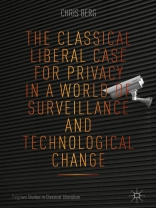How should a free society protect privacy? Dramatic changes in national security law and surveillance, as well as technological changes from social media to smart cities mean that our ideas about privacy and its protection are being challenged like never before. In this interdisciplinary book, Chris Berg explores what classical liberal approaches to privacy can bring to current debates about surveillance, encryption and new financial technologies. Ultimately, he argues that the principles of classical liberalism – the rule of law, individual rights, property and entrepreneurial evolution – can help extend as well as critique contemporary philosophical theories of privacy.
Table of Content
Chapter 1: Introduction.- Chapter 2: Classical Liberalism and the Public-Private Division.- Chapter 3: A Classical Liberal Approach to Privacy.- Chapter 4: Privacy and the Ancient Home.- Chapter 5: The Origins of Modern Privacy.- Chapter 6: Utopia and State Power.- Chapter 7: Technology Extends the Home.- Chapter 8: Privacy and the State.- Chapter 9: Privacy, Property and Discovery. Chapter 10: Privacy and Speech.- Chapter 11: Financial Privacy.- Chapter 12: The Future of Privacy.- Chapter 13: Conclusion.
About the author
Chris Berg is a Senior Research Fellow at the RMIT Blockchain Innovation Hub, School of Economics, Finance and Marketing, RMIT University, Australia. He is also a Senior Fellow with the Institute of Public Affairs, Australia and an Academic Fellow with the Australian Taxpayers’ Alliance. Berg is one of Australia’s most prominent voices for free markets and individual liberty and a leading authority on regulation, economic freedom, civil liberties and technological change.












